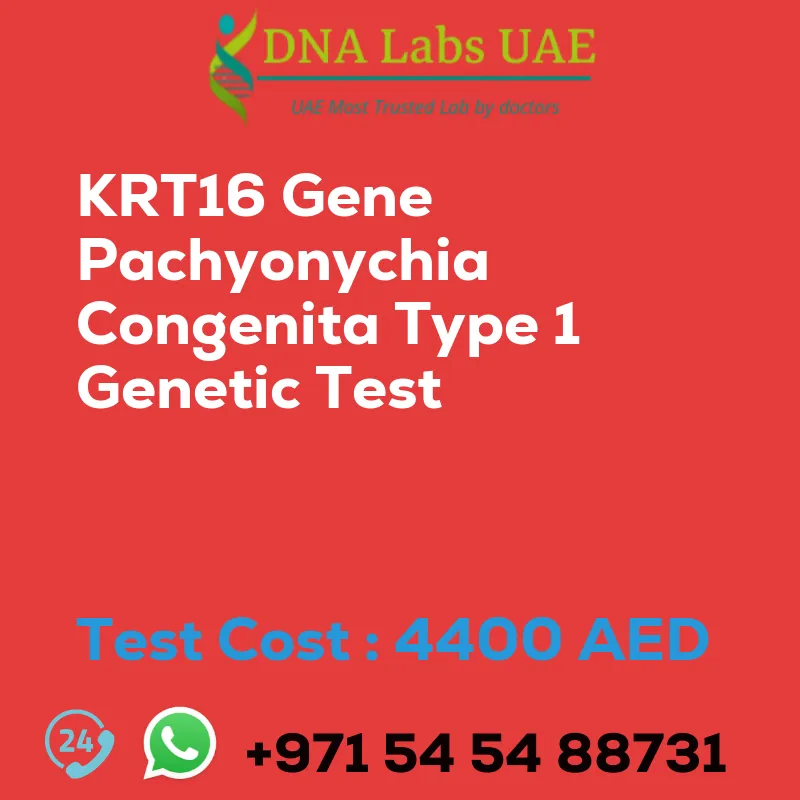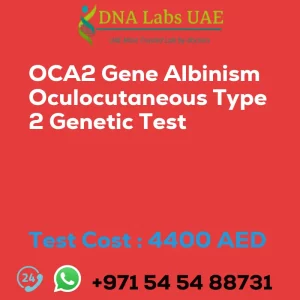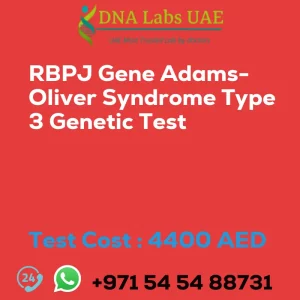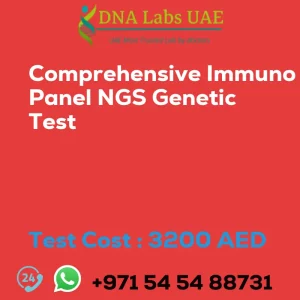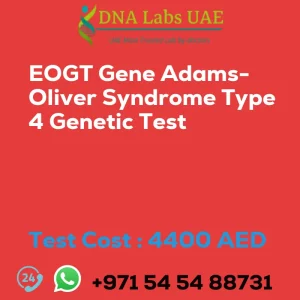KRT16 Gene Pachyonychia congenita type 1 Genetic Test
At DNA Labs UAE, we offer the KRT16 Gene Pachyonychia congenita type 1 Genetic Test for individuals who suspect they may have Pachyonychia congenita type 1 (PC-1), a rare genetic disorder affecting the nails, skin, and mucous membranes.
Test Details
The KRT16 gene is associated with PC-1 and mutations in this gene can lead to the development of the disorder. Our NGS (Next-Generation Sequencing) genetic testing method allows for the simultaneous analysis of multiple genes, including the KRT16 gene.
Components
The KRT16 Gene Pachyonychia congenita type 1 Genetic Test is priced at 4400.0 AED.
Sample Condition
We require a blood sample, extracted DNA, or one drop of blood on an FTA card for the test.
Report Delivery
Once the sample is received, the report will be delivered within 3 to 4 weeks.
Method
We utilize NGS technology for the KRT16 Gene Pachyonychia congenita type 1 Genetic Test.
Test Type
The test falls under the categories of Osteology, Dermatology, and Immunology Disorders.
Doctor
A dermatologist will oversee the test.
Test Department
The test is conducted in our Genetics department.
Pre Test Information
Prior to the test, we require a clinical history of the patient and a genetic counseling session to draw a pedigree chart of family members affected by PC-1 and the KRT16 gene.
Understanding Pachyonychia congenita type 1
Pachyonychia congenita type 1 (PC-1) is a rare genetic disorder characterized by abnormalities in the nails, skin, and mucous membranes. It is caused by mutations in the KRT16 gene, which encodes a protein called keratin 16.
NGS Genetic Testing
Next-Generation Sequencing (NGS) genetic testing is a cutting-edge DNA sequencing technology that allows for the analysis of multiple genes or even the entire genome. In the case of Pachyonychia congenita type 1, NGS testing can identify mutations in the KRT16 gene.
The process involves extracting DNA from a patient’s blood or saliva sample and sequencing it using advanced sequencing platforms. The resulting DNA sequences are then analyzed to identify any mutations or variations in the KRT16 gene.
NGS genetic testing provides a definitive diagnosis of Pachyonychia congenita type 1 by identifying specific mutations in the KRT16 gene. This information is crucial for treatment decisions, genetic counseling, and family planning.
| Test Name | KRT16 Gene Pachyonychia congenita type 1 Genetic Test |
|---|---|
| Components | |
| Price | 4400.0 AED |
| Sample Condition | Blood or Extracted DNA or One drop Blood on FTA Card |
| Report Delivery | 3 to 4 Weeks |
| Method | NGS Technology |
| Test type | Osteology Dermatology Immunology Disorders |
| Doctor | Dermatologist |
| Test Department: | Genetics |
| Pre Test Information | Clinical History of Patient who is going for KRT16 Gene Pachyonychia congenita type 1 NGS Genetic DNA Test. A Genetic Counselling session to draw a pedigree chart of family members affected with KRT16 Gene Pachyonychia congenita type 1 NGS Genetic DNA Test gene KRT16 |
| Test Details |
The KRT16 gene is associated with Pachyonychia congenita type 1 (PC-1), a rare genetic disorder that affects the nails, skin, and mucous membranes. PC-1 is caused by mutations in the KRT16 gene, which encodes a protein called keratin 16. NGS (Next-Generation Sequencing) genetic testing is a type of DNA sequencing technology that allows for the simultaneous analysis of multiple genes or even the entire genome. In the context of Pachyonychia congenita type 1, NGS genetic testing can be used to identify mutations in the KRT16 gene. NGS testing involves extracting DNA from a patient’s blood or saliva sample and sequencing the DNA using advanced sequencing platforms. The resulting DNA sequences are then analyzed to identify any mutations or variations in the KRT16 gene. By identifying specific mutations in the KRT16 gene, NGS genetic testing can provide a definitive diagnosis of Pachyonychia congenita type 1. This information can be used to guide treatment decisions, genetic counseling, and family planning. |

